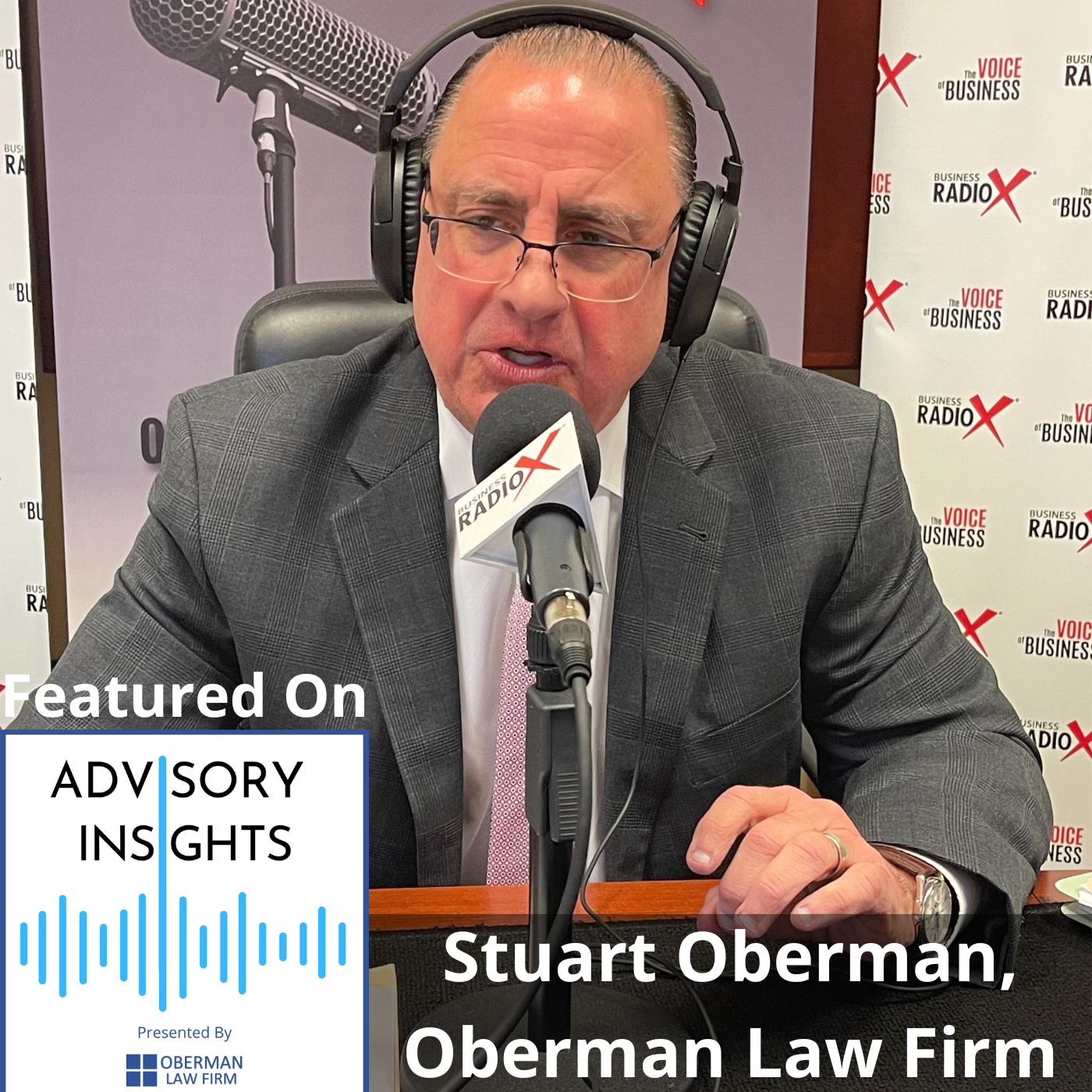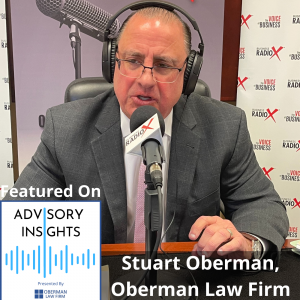
Should You Be Paying Employees for Travel Time? (Advisory Insights Podcast, Episode 19)
On this episode of Advisory Insights, Stuart Oberman of the Oberman Law Firm discusses the topic of employee travel time, particularly the 1947 Portal-to-Portal Act and how it addresses job to job travel. He advises employers to have a clear policy in place to avoid costly mistakes, and urges them to keep track of travel-related expenses and policy changes.
Advisory Insights is presented by Oberman Law Firm and produced by the North Fulton studio of Business RadioX®. The series can be found on all the major podcast apps. You can find the complete show archive here.
TRANSCRIPT
Intro: [00:00:02] Broadcasting from the studios of Business RadioX, it’s time for Advisory Insights. Brought to you by Oberman Law Firm, serving clients nationwide with tailored service and exceptional results. Now, here’s your host.
Stuart Oberman: [00:00:20] Welcome everyone to Advisory Insights. Stuart Oberman here. All right, folks, we’re going to drill down on some things that is a topic that, really, we didn’t see much during COVID. But now as everything is starting opening up, we’re going to talk about employees that travel. Today’s topic, Do employers have to pay for employee travel or commute time?
Stuart Oberman: [00:00:43] You’re probably thinking to yourself, “No, I do not.” But the question is you’re probably wrong, depending on your business. And two, do you even have a policy for that? And are you even paying overtime? So, I want to hit a couple of topics going down this particular road that I want everyone to take a look at, because at some point your employees do something somewhere for you, whether they’re traveling from their home, whether they’re going to their office. A lot of our clients go on conventions, how are you paying? How are you paying? Travel, no travel, gas, no gas, overtime, no overtime. So, these are things I want to look at.
Stuart Oberman: [00:01:21] First, I want to take a look at whether an employer has to pay its non-exempt employees overtime. Are they even eligible? That’s your first question. So then, we want to look in today’s podcast looking at work related travel. That will include time spent getting to and from office or job sites. What if you’re a construction company and you have people driving from the office to the job site? What about from home to the job site? What about from job site-home? Do you even have a regulation for that? Are they driving company vehicles? These are things you have to ask.
Stuart Oberman: [00:02:10] So, I want to look at really two fundamental principles. One, actually performing work related tasks regardless, regardless of the day of the week, the time, or location. How is it being paid? Do you have employees that work on Saturdays at their home, Sundays at home, after hours, they’re coming home? How are you paying that? How are you verifying that?
Stuart Oberman: [00:02:33] Principle number two, the cornerstone of all this discussion is the 1947 Portal-to-Portal Act and its amendments to the Fair Labor Standards Act. Folks, that will put you to sleep if you read that. But essentially what it is, it’s employees spending time commuting from their home to the workplace, where do they begin the workday, and how do they end? Are they being paid for it going back home?
Stuart Oberman: [00:03:08] So, for those of you that never heard of the Portal-to-Portal Act and how it is related to the Fair Labor Standards Act, which governs what your employees do and what you pay every day, if you say I have no idea, I would advise you strongly to call someone who knows what that is.
Stuart Oberman: [00:03:31] Now, a couple topics. Do you have a policy for midday travel? Under federal regulations that’s considered all in a day’s work rule. You’re going to go down a road on that one. We’re not even going to go down there today because we’re going to go down for hours on that one.
Stuart Oberman: [00:03:52] So, what is it? It’s travel to the job site to job site during the workday. If you have a person that’s going job to job, site to site traveling salesman, construction foreman, whatever it is, do you have a regulatory item that you’re looking at and what are you guided by?
Stuart Oberman: [00:04:11] Next, I want you to look at multiple worksites. So, what if an employee reports to different sites each morning? Does that render the home to work commute not normal or ordinary? That’s a question you’ve got to ask yourself. And is that time spent on the road – big word – compensable overtime? Are you paying for that? How are you paying for it or why aren’t you paying for it? Are you even tracking that employee’s time?
Stuart Oberman: [00:04:47] Another hot topic, pre-commute activities. We have a lot and a lot of people that do work at their home before they even leave. I know I do. I know I do. My day starts at 5:30, and I’m doing work before I leave the house for the office. So, what if an employee brings some work home at night and then goes to the office, are they working at night? Are they working during the day? How are you tracking that? That is what we call a pre-commute activity. Do you have a regulatory item of review for that?
Stuart Oberman: [00:05:24] The next topic I want you to take a look at – these are all things I want you to understand that, again, are much too detailed for this podcast, but at least you know the topic and what it relates to and how it relates to what you do – same day travel to another city.
Stuart Oberman: [00:05:42] I’m located in Atlanta. Suppose I go to Chattanooga. You know, or I’ve got a company that’s in South Atlanta and they travel to Nashville for the day? That’s what we call special one day assignments. Do you have a policy in place for that or do you even track that? Because I will guarantee you, your employees that leave, folks, they’re tracking that. And you better be aware they are tracking it because otherwise they’re going to track it for you, which is never a good day.
Stuart Oberman: [00:06:14] So, let’s take a look at, also, do you have a policy in place for travel involving an overnight stay? Do you even have overtime travel expenses outlined? Are you paying overtime? How are you paying your people that travel? You know, again, through the COVID, everyone was locked down, no travel. And now, folks, it is wide open. If you look at the papers, you listen to the news, travel, it explodes. The airlines can’t keep up with it. Hotels are doing real well, You know, rush hour traffic going to and from on holidays, I mean, it’s amazing. So, how do you have overnight travel? How do you handle that?
Stuart Oberman: [00:06:58] Also, travel from a hotel to a worksite or worksite to hotel. Again, where are your salespeople going? Are they spending the night? How are they spending the night with their time? Are they working on their laptop when they’re at the hotel? How are you tracking that? You better believe they’re tracking that. Are they working at the hotel before they leave? That can be overtime. How are you tracking your job site issues? Is that going to be O.T.?
Stuart Oberman: [00:07:27] Now, question, what if driving is part of the job? You know, the FLSA, it outlines an employee who drives a bus, a car, automobile, boat, plane as part of their job. Do you have anything in place that outlines that, “Hey, we’re not paying you overtime, Mr. Employee or Ms. Employee, because it’s outlined here we’re not doing that.”
Stuart Oberman: [00:07:54] Now, the wonderful world of COVID, remote, flexible, agile – the keyword of today – agile work conditions. What if you have an employee that’s hoteling working remote, flexible hours? A agile working arrangement where they come into some particular place two or three times a week. Or what about two or three times a month? What’s the regulatory matter? Are you requiring them to come into the office? Are you requiring them to come into their location, whether it’s remote, not remote?
Stuart Oberman: [00:08:35] Now, I want to ask you this question, so do you have or do you even know the consequences of compensable travel time? Are you tracking those? Do you know when you must pay the employees? Do you have a process in place to track the time? First and foremost, how are you tracking time? “Well, my employees have logs.” I will tell you, employers are not keeping track of their logs.
Stuart Oberman: [00:09:02] I would venture to say that if you have an employee company car and you say,”Hey, Mr. Employee, Ms. Employee. I want you to produce your logs. I want to see how up to date they are.” I’m going to go out on a limb, I’m going to say at least 80 to 90 percent are not even up to date maybe in a day or two, some even months. So, I think you got to have a process in place of how much you’re paying them. Are they overtime hours? Are they not overtime hours? And what’s the threshold? Do your hours start at 42 hours O.T.? Do your hours start at 46 O.T.?
Stuart Oberman: [00:09:40] Next question is, how are you paying for travel? How much is compensable travel? Folks, you got people on the road and you got guys going to job, to job, to job, to job. You’ve got to ask yourself all these topics we went through today, how am I paying these people? And then, does paying for travel make it hours worked? How are you calculating these things?
Stuart Oberman: [00:10:06] So, employees often wonder, you know, what’s hours worked considered? Do I even have a definition of hours worked? Chances are probably not. I would venture to say that all the topics we listed today, 90 percent that have employees that travel have no guidelines whatsoever regarding this. I’ll go out on a limb and I’ll say 70 to 80 percent don’t even have a policy employee manual. Without a manual, you got no regulatory guidance on these things. So, you’re going to lose. You’re going to lose.
Stuart Oberman: [00:10:37] I want you to keep track of these things. I want you to listen on the topics. If you don’t have an agenda, if you don’t have a bullet point items that you’re looking at, I urge you to find counsel that understands this. Make sure your H.R. people are trained.
Stuart Oberman: [00:10:55] Folks, that’s going to conclude today’s podcast, Advisory Insights, Stuart Oberman. If you need to reach us, please feel free to call at 770-886-2400 or email stuart, S-T-U-A-R-T, @obermanlaw.com. Folks, thanks a lot. Have a fantastic day and we’ll look forward to more podcasts.
Outro: [00:11:19] Thank you for joining us on Advisory Insights. This show is brought to you by Oberman Law Firm, a business-centric law firm representing local, regional, and national clients in a wide range of practice areas, including health care, mergers and acquisitions, corporate transactions, and regulatory compliance.
About Advisory Insights Podcast
Presented by Oberman Law Firm, Advisory Insights Podcast covers legal, business, HR, and other topics of vital concern to healthcare practices and other business owners. This show series can be found here as well as on all the major podcast apps.
Stuart Oberman, Oberman Law Firm

Stuart Oberman is the founder and President of Oberman Law Firm. Mr. Oberman graduated from Urbana University and received his law degree from John Marshall Law School. Mr. Oberman has been practicing law for over 25 years, and before going into private practice, Mr. Oberman was in-house counsel for a Fortune 500 Company. Mr. Oberman is widely regarded as the go-to attorney in the area of Dental Law, which includes DSO formation, corporate business structures, mergers and acquisitions, regulatory compliance, advertising regulations, HIPAA, Compliance, and employment law regulations that affect dental practices.
In addition, Mr. Oberman’s expertise in the healthcare industry includes advising clients in the complex regulatory landscape as it relates to telehealth and telemedicine, including compliance of corporate structures, third-party reimbursement, contract negotiations, technology, health care fraud, and abuse law (Anti-Kickback Statute and the State Law), professional liability risk management, federal and state regulations.
As the long-term care industry evolves, Mr. Oberman has the knowledge and experience to guide clients in the long-term care sector with respect to corporate and regulatory matters, assisted living facilities, continuing care retirement communities (CCRCs). In addition, Mr. Oberman’s practice also focuses on health care facility acquisitions and other changes of ownership, as well as related licensure and Medicare/Medicaid certification matters, CCRC registrations, long-term care/skilled nursing facility management, operating agreements, assisted living licensure matters, and health care joint ventures.
In addition to his expertise in the health care industry, Mr. Oberman has a nationwide practice that focuses on all facets of contractual disputes, including corporate governance, fiduciary duty, trade secrets, unfair competition, covenants not to compete, trademark and copyright infringement, fraud, and deceptive trade practices, and other business-related matters. Mr. Oberman also represents clients throughout the United States in a wide range of practice areas, including mergers & acquisitions, partnership agreements, commercial real estate, entity formation, employment law, commercial leasing, intellectual property, and HIPAA/OSHA compliance.
Mr. Oberman is a national lecturer and has published articles in the U.S. and Canada.
Oberman Law Firm
Oberman Law Firm has a long history of civic service, noted national, regional, and local clients, and stands among the Southeast’s eminent and fast-growing full-service law firms. Oberman Law Firm’s areas of practice include Business Planning, Commercial & Technology Transactions, Corporate, Employment & Labor, Estate Planning, Health Care, Intellectual Property, Litigation, Privacy & Data Security, and Real Estate.
By meeting their client’s goals and becoming a trusted partner and advocate for our clients, their attorneys are recognized as legal go-getters who provide value-added service. Their attorneys understand that in a rapidly changing legal market, clients have new expectations, constantly evolving choices, and operate in an environment of heightened reputational and commercial risk.
Oberman Law Firm’s strength is its ability to solve complex legal problems by collaborating across borders and practice areas.
Connect with Oberman Law Firm:
Company website | LinkedIn | Twitter
















